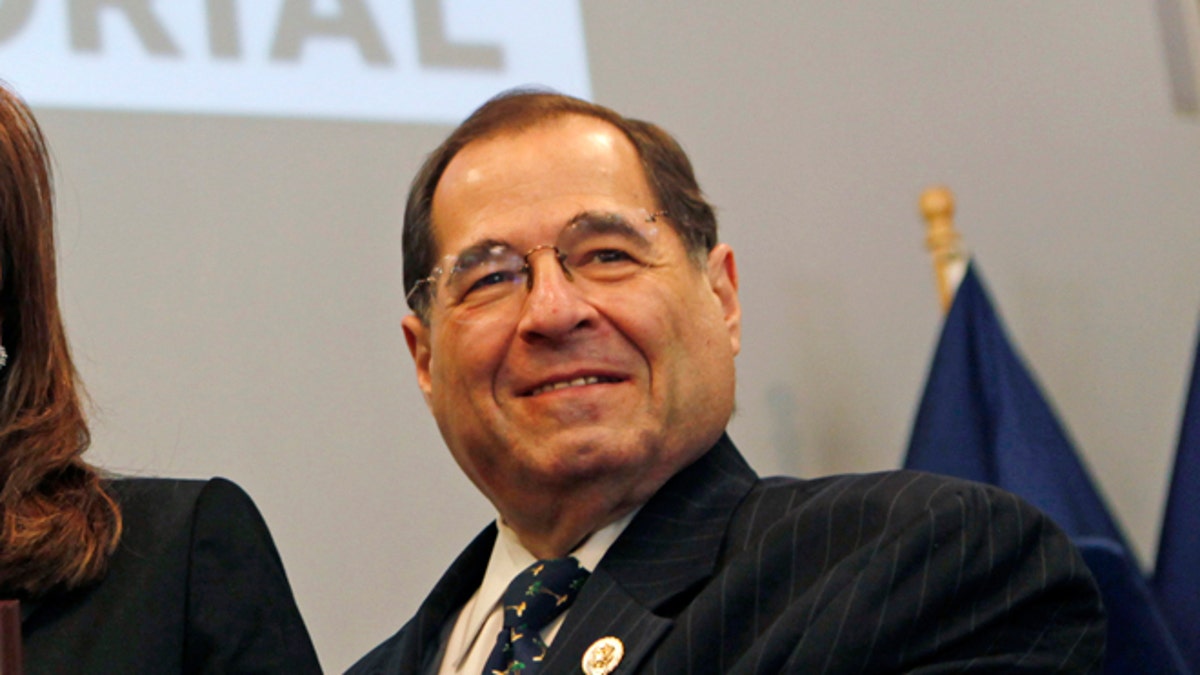
FILE: June 20, 2011: Rep. Jerrold Nadler, D-N.Y., at a ceremony for a national 9/11 memorial medal, in New York City. (REUTERS)
A Capitol Hill lawmaker sparked a string of conflicting statements about the limits of U.S. surveillance after claiming during a hearing last week that he was told officials can listen to phone calls without a warrant.
Rep. Jerrold Nadler made the comments during a hearing Thursday, but has since appeared to walk them back as the intelligence community denied the claim. Meanwhile, NSA leaker Edward Snowden continued to fuel the speculation on Monday when he claimed, during an online chat, that the “content” of Americans’ communications is accessible to some analysts without a warrant.
Earlier this month, Snowden, until recently an NSA contractor, disclosed information about the federal government’s widespread data collection on phone calls and Internet activities, including emails and text messages.
Such practices, in the aftermath of 9/11, were known to Washington lawmakers. But the depth and range shocked the public and at least some on Capitol Hill, who have tried to learn to what extent the government listens to conversations or reads emails and other messages without a warrant for the Foreign Intelligence Surveillance Act court.
The latest controversy started late Saturday when the online tech publication CNET published a report on the New York Democratic congressman’s comments. According to CNET’s reading of the remarks, Nadler said he was told during a briefing that phone call contents could be accessed "simply based on an analyst deciding that."
Nadler did say that during an exchange with FBI Director Robert Mueller on the Hill. But the full exchange also revealed some possible confusion.
Mueller, when asked whether authorities need a warrant to listen to phone calls, said officials would need a court-approved order.
Nadler complained that he had been told “precisely the opposite” during a recent briefing, and that he was told an analyst could get “specific information” on phone calls without a warrant.
On Sunday, the Office of the Director of National Intelligence issued a statement that appeared to refute Nadler’s claim.
“The statement that a single analyst can eavesdrop on domestic communications without proper legal authorization is incorrect and was not briefed to Congress,” the statement said.
That practice, under FISA section 702, applies only to foreigners overseas for valid foreign-intelligence purposes and “cannot be used to target Americans anywhere in the world,” the statement concluded.
The same day, Nadler’s office issued a statement suggesting the Obama administration had denied the congressmen’s claim, or at least clarified it.
"I am pleased that the administration has reiterated that, as I have always believed, the NSA cannot listen to the content of Americans' phone calls without a specific warrant," Nadler told CNET, through a spokesman.
The spokesman declined to further clarify what assurances the administration gave them, when reached by FoxNews.com on Monday.
That might have been the end of it. However, Snowden addressed the issue when asked during an online chat hosted by Guardian.com. He did not explicitly say anyone is listening to phone calls without a warrant, but said some officials have access to “content” without a warrant.
“Americans’ communications are collected and viewed on a daily basis on the certification of an analyst rather than a warrant,” Snowden said. “They excuse this as ‘incidental’ collection, but at the end of the day, someone at NSA still has the content of your communications.”
Snowden also said Monday that even when a warrant is used, “it's important to understand the intelligence community doesn't always deal with what you would consider a ‘real’ warrant like a police department would have to.”
He said the warrant is “more of a templated form they fill out and send to a reliable judge with a rubber stamp.”





















